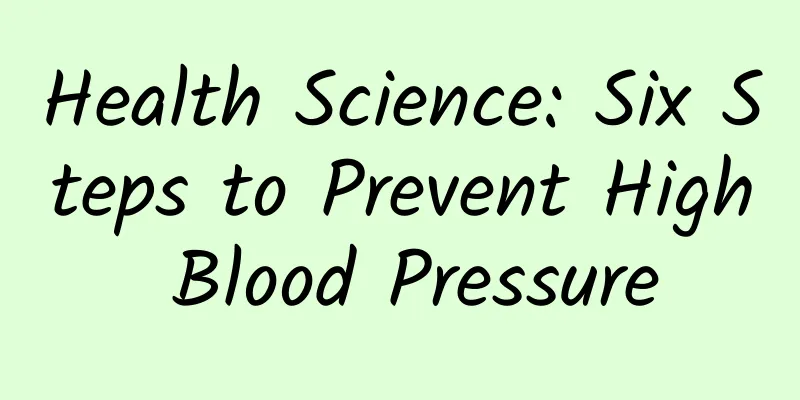Health Science: Six Steps to Prevent High Blood Pressure

|
1. Prevent high blood pressure, start every day (six steps to a healthy lifestyle: limit salt intake, lose weight, exercise more, quit smoking and drinking, keep a calm mind) 1. Limit sodium salt intake: Excessive sodium salt intake increases the risk of high blood pressure. Long-term salt restriction can slow down the rate at which blood pressure rises with age. The average salt intake of Chinese residents exceeds 9g/day. The World Health Organization recommends that the salt intake per person should not exceed 5g/day. It is recommended to replace ordinary salt with low-sodium salt. 2. Lose weight: Overweight and obesity can lead to high blood pressure and increase the risk of hypertension. Abdominal obesity may have a stronger correlation with hypertension. It is recommended that overweight and obese people lose weight and keep waist circumference below 90cm for men and 80cm for women. 3. Moderate exercise: Exercise can reduce sympathetic nerve activity, relieve tension, reduce weight, and reduce the risk of hypertension. It is recommended to perform at least 150 minutes of moderate-intensity aerobic exercise (such as brisk walking, jogging, swimming or cycling) per week according to your own conditions, and perform appropriate muscle strength and flexibility exercises. 4. Quit smoking: Smoking can increase the risk of cardiovascular and cerebrovascular diseases. It is recommended to quit smoking (including traditional cigarettes and e-cigarettes). 5. Quit drinking: Drinking a lot of alcohol raises blood pressure, and not drinking is the best for health. It is recommended that patients with hypertension not drink alcohol. Patients with hypertension who are currently drinking alcohol are advised to quit drinking. 6. Maintain psychological balance: Long-term mental stress, anxiety, and depression can increase the risk of hypertension. You should maintain a positive and optimistic attitude and avoid negative emotions. Actively accept psychological intervention when necessary. 2. If blood pressure exceeds 130/80 mmHg, you should start paying attention 1. If blood pressure exceeds 140/90 mmHg three times on different days without using antihypertensive drugs, it can be diagnosed as hypertension and lifestyle intervention and drug treatment can be started. 2. Blood pressure above 130/80 mmHg should be a cause for concern. As blood pressure rises, it may cause harm to organs such as the heart, brain, and kidneys. Lifestyle intervention should be started early, and antihypertensive drug treatment should be started as early as possible for patients who have already developed target organ damage and cardiovascular and cerebrovascular complications. 3. Control high blood pressure and protect the heart, brain and kidneys 1. The main harm of hypertension is that it can damage important organs such as the heart, brain, and kidneys, and can even be life-threatening, so active treatment should be taken to control blood pressure. Treatment strategies include a healthy lifestyle and drug therapy. 2. All patients should adhere to a healthy lifestyle. Healthy lifestyle intervention can effectively lower blood pressure or directly reduce the risk of cardiovascular and cerebrovascular diseases. 3. Hypertensive patients whose blood pressure cannot reach the target level with lifestyle intervention alone should actively receive antihypertensive drug treatment. 4. Steady blood pressure reduction and long-term compliance 1. Hypertensive patients should take medication for a long time and are encouraged to choose long-acting antihypertensive drugs that can be taken once a day to ensure stable blood pressure reduction. For patients who need combined antihypertensive drug treatment, it is recommended to give priority to single-tablet compound preparations. 2. Blood pressure target standard: For patients with general hypertension, blood pressure should be reduced to below 140/90 mmHg. For patients with diabetes, coronary heart disease, heart failure or chronic kidney disease with proteinuria, blood pressure should be controlled below 130/80 mmHg. For patients aged 65-79, blood pressure should be reduced to below 140/90 mmHg. If tolerated, it can be further reduced to below 130/80 mmHg. For elderly patients aged 80 and above, blood pressure can be controlled to below 140/90 mmHg. Nine common misunderstandings about hypertension prevention and treatment Myth 1: Blood pressure is normal, so you can stop taking the medicine Do not stop taking the medicine on your own! Strictly follow the doctor's instructions to gradually reduce the dosage and observe, but do not stop taking the medicine on your own. Normal blood pressure means that it is well controlled, not "cured"! Blood pressure will rise again. Intermittent medication can easily cause blood pressure fluctuations, which will cause more serious damage to organs such as the heart, brain, and kidneys. Myth 2: The faster and lower the blood pressure drops, the better. When treating blood pressure, it is important to adhere to the principle of steady blood pressure reduction. If blood pressure drops too quickly, it can cause insufficient perfusion of important organs such as the heart, brain, and kidneys, leading to ischemic events. Myth 3: It’s okay for the elderly to have high blood pressure It is often believed that it is normal for the elderly to have high blood pressure. In fact, there is no age division in the diagnostic criteria for hypertension . It is recommended that healthy elderly people aged 65 to 80 should start drug treatment as long as they can tolerate the treatment and their systolic blood pressure exceeds 140 mmHg. Myth 4: No need to change your lifestyle As long as you follow the doctor's advice and take the medicine regularly for a long time, there is no need to change your lifestyle. In fact, improving your lifestyle and taking antihypertensive drugs are both important for controlling blood pressure. It is difficult to control blood pressure stably in the long term by simply taking medicine and ignoring lifestyle changes. Myth 5: Frequent changes in antihypertensive drugs Some patients will ask their doctors to change their antihypertensive drugs if they do not see any effect within a few days. In fact, most long-acting antihypertensive drugs need to be taken continuously for 2 to 4 weeks to fully exert their antihypertensive effect and achieve maximum therapeutic effect. Myth 6: I don’t want to take medicine because it has side effects Not treating high blood pressure is more dangerous than side effects from medication! Some patients believe that Western medicine has serious side effects and are unwilling to take it for a long time. In fact, there are many safe and effective drugs for controlling high blood pressure. The side effects of commonly used antihypertensive drugs are mild and reversible. Myth 7: High blood pressure is not serious if there are no symptoms Some patients have had high blood pressure for a long time and their bodies have already tolerated it, so they may not feel anything. If high blood pressure is not treated, it can lead to complications such as myocardial infarction, cerebral infarction, and cerebral hemorrhage. Myth 8: Thinking you can’t stop taking medication once you start Antihypertensive drugs can cause "drug resistance" and make it impossible to stop taking them. This is a very wrong and dangerous concept . First, antihypertensive drugs are not antibiotics and will not cause "drug resistance". Second, early control of blood pressure can prevent damage to target organs such as the heart, brain, and kidneys. Myth 9: Only taking medicine but not regular checkups The vast majority of hypertensive patients need to undergo regular checkups in addition to taking lifelong medication to evaluate the efficacy of antihypertensive drugs and monitor target organ damage. Doctor's reminder: Hypertension is a lifelong disease Lifelong blood pressure monitoring required High blood pressure itself is not terrible The scary thing is the complications It is recommended that patients with hypertension go to a regular hospital for treatment The doctor will formulate a treatment plan based on the specific situation |
<<: Health Science: Don’t Let Monkeypox Play Tricks on You
Recommend
hcg negative no menstruation
If it is a normal pregnancy phenomenon or irregul...
Men tend to grow belly in middle age, which may be related to this
Author: Xiao Hengjun, Chief Physician, The Third ...
What are the diet recipes and methods after miscarriage?
For female friends, miscarriage is a very harmful...
What are the precautions after fallopian tube hydrotubation?
As we all know, tubal hydrotubation is a method t...
How to stop bleeding when your period doesn't end
In our lives, some women's menstruation is no...
Why are women's nipples dark?
Tender nipples represent a person's youthful ...
What fruits are good for uterine fibroids? Remember these treasures!
Uterine fibroids can cause great harm to women. Y...
5 fitness exercises that you can do at home, simple and effective, you can easily exercise your whole body without spending any money, try it now!
The Paris Olympics, as a global sports event, is ...
Dull pain in the lower left side of the female abdomen
A dull pain in the lower left side of the abdomen...
Normal range of endometrial thickness
The thickness of the endometrium is very importan...
How to prevent breast sagging during pregnancy?
For women, breasts can be considered the standard...
What is the reason for the delay of 12 days?
We all know that menstruation is a unique physiol...
What is the happiness of life?
Leviathan Press: "Don't have too many ex...
What does it mean when the echo of the uterine myometrium is uneven?
Women generally have more physical examinations t...
What should pregnant women do if they have pain in the back of their head?
Pain in the back of the head during pregnancy may...









